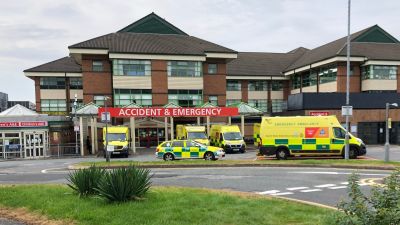Bolton Hospital's desperate plea for people to stop turning up at A&E for coronavirus tests

Royal Bolton Hospital has issued a desperate plea for people to stop turning up hoping to get a coronavirus test.
Bolton still has the highest infection rate of Covid-19 in the country, with 189 new positive tests registered for every 100,000 people over the last week. With schools and many businesses reopening, there has been a sharp surge in demand for tests.
But health chiefs have criticised the government for recent reports of problems with the testing system. Professor Donna Hall, who leads Bolton NHS Foundation Trust, said thegovernment's strategy is 'fundamentally flawed' and that local health structures which could have managed testing in the borough have been bypassed.
Now the town's main hospital has seen an influx in both Covid-19 patients requiring treatment and general A&E patients. The situation is not being helped by patients turning up and requesting a coronavirus test.
All tests must be booked in advance and there are no walk-up or drop-in testing sites in Bolton.
It comes ahead of the Prime Minister's appearance in the Commons, where he will face senior MPs who are likely to question him on the Government's handling of the coronavirus crisis.
Boris Johnson will face deputy Labour leader Angela Rayner for PMQs at noon because Sir Keir Starmer remains in isolation as he is "still awaiting" a coronavirus test result for a member of his family.
Health Secretary Matt Hancock has admitted that it might be "a matter of weeks" before the testing problems are resolved, and on Tuesday announced that tests in England will be rationed.
He said there would be "prioritisation" of tests for people with acute clinical need and those in social care settings as he acknowledged "operational challenges" in the system.
The updated prioritisation list which will set out who will be at the front of the queue is yet to be published.
Mr Hancock faced a barrage of complaints in the Commons about people being forced to travel long distances or even enter false addresses in the hope of securing a test.
He said there had been a "sharp rise" in people coming forward for a test, including some who are not eligible but Government sources acknowledged there was no accurate data on the latter.